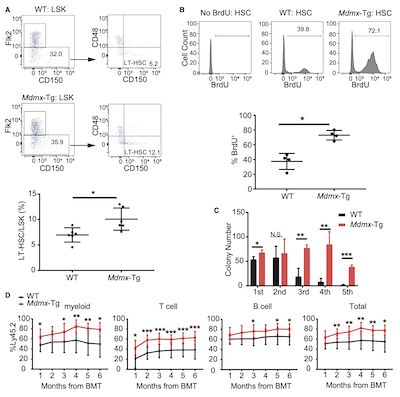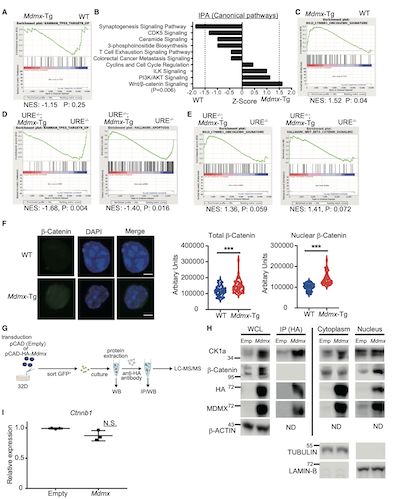Cancer Cell: MDMX is the key to the progression of myeloid lymphoma
- Normal Liver Cells Found to Promote Cancer Metastasis to the Liver
- Nearly 80% Complete Remission: Breakthrough in ADC Anti-Tumor Treatment
- Vaccination Against Common Diseases May Prevent Dementia!
- New Alzheimer’s Disease (AD) Diagnosis and Staging Criteria
- Breakthrough in Alzheimer’s Disease: New Nasal Spray Halts Cognitive Decline by Targeting Toxic Protein
- Can the Tap Water at the Paris Olympics be Drunk Directly?
Cancer Cell: MDMX is the key to the progression of myeloid lymphoma
Cancer Cell: MDMX is the key to the progression of myeloid lymphoma. MDMX protein is overexpressed in most patients with acute myeloid leukemia (AML).
In a study recently published in Cancer Cell, Ulrich Steidl’s team from Einstein College of Medicine found that MDMX overexpression increased the number and competitive advantage of pre-leukemia stem cells (pre-LSC).

(Image source: www.cell.com)
Although mutations of the tumor suppressor gene p53 are very common in various solid tumors, they are relatively rare in AML patients (accounting for 10% of patients).
In most AML with normal TP53, the function of p53 protein is inhibited by its inhibitors Murine Double Minute 2 (MDM2) and Murine Double Minute X (MDMX, also known as MDM4). In addition, MDMX, a protein that interacts with p53 and prevents its activation, is overexpressed in the vast majority of AML patients (about 90%).

(Figure 1, MDMX overexpression affects the proliferation and differentiation of bone marrow stem cells)
Previous studies have demonstrated that AML with normal TP53 is responsive to the new MDMX/MDM2 dual inhibitor (ALRN-6924), and some clinical trials are currently underway.
However, the pathogenicity of MDMX overexpression and its effect on normal or abnormal hematopoietic function have not been studied, the latter is particularly critical for stem cell aberrations in the pre-transformation stage of leukemia.

(Figure 2, MDMX overexpression activates Wnt /β-Catenin signaling activity in leukemic pre-transformed stem cells)
In order to study the overexpression of MDMX in normal and malignant hematopoiesis, the authors established a Mdmx transgenic mouse model (Mdmx-Tg). The mice suffered from various solid tumors or a variety of solid tumors after a long incubation period (median of 550 days). Lymphoma and death.
The study found that the overexpression of MDMX increased the number, proliferation and competitiveness of hematopoietic stem cells in transgenic mice. On this basis, the authors found that MDMX overexpression, together with other myeloid disease-related alleles, acted as a driving force for the transition from preleukemia to AML.
Later, the author found through transcriptomics analysis that the overexpression of MDMX can lead to the up-regulation of Wnt/β-Catenin signaling activity in pre-transformed leukemia stem cells, and this effect is mediated by the physical interaction between MDMX and CK1α.
Chemically inhibiting the activity of Wnt /β-Catenin or artificially increasing the expression level of CK1α can effectively “rescue” the “carcinogenic” characteristics of pre-transformed leukemia stem cells caused by the overexpression of MDMX.
Finally, the authors analyzed the involvement of p53 gene in this signal, and the results showed that MDMX-driven bone marrow stem cell expansion and Wnt/β-Catenin upregulation were not affected by p53 gene.
In summary, the authors used a new mouse model and found that MDMX overexpression can trigger a variety of chronic/asymptomatic pre-leukemia conditions to develop into the final AML.
Transcriptomics and proteomics studies have shown that MDMX overexpression plays a role in promoting cancer by activating Wnt/β-Catenin signaling in pre-transformed leukemia stem cells.
The study revealed that MDMX overexpression is the key to the transition from preleukemia to AML, and revealed that Wnt/β-Catenin signaling is an atypical downstream signaling pathway of MDMX, which has the potential to prevent and treat cancer.
(source:internet, reference only)
Disclaimer of medicaltrend.org



